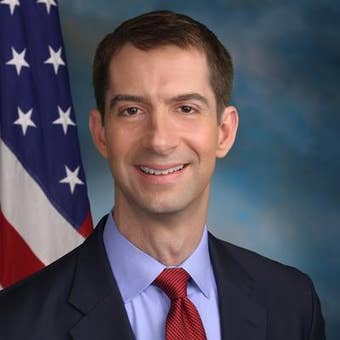Sen. Cotton: 'I don't think' it's necessary to keep troops at Capitol
Sen. Tom Cotton, R-Ark., discusses the threats China poses to America, House Speaker Nancy Pelosi's request to keep National Guard troops at the Capitol through mid-March and Biden's executive orders on immigration on 'Sunday Morning Futures.'
PROGRAMMING ALERT: WATCH SEN. TOM COTTON ON "HANNITY" ON WEDNESDAY EVENING AT 9 P.M. ET
Last summer, as left-wing mobs rioted in the streets and threatened to overwhelm local police and even the National Guard, I wrote an op-ed in The New York Times titled "Send in the Troops." I argued that the president should deploy federal troops, if necessary, to restore and maintain order.
My position was grounded in federal law, based on many historical precedents, and supported by a majority of Americans. But this argument outraged many on the left, so much so that the editor of the New York Times opinion page lost his job for publishing it.
But when a different mob chanting different slogans threatened our Capitol, many of my critics sang a different tune.
I’m ruefully gratified that so many of them have rallied to my side. Perhaps they’ll show more gratitude for law enforcement the next time a mob threatens public safety and order, no matter what cause the perpetrators claim to support.
DC NATIONAL GUARD DEPLOYMENT IN NATION'S CAPITAL EXTENDED THROUGH END OF MARCH
The National Guard soldiers who deployed to protect the Capitol this month certainly deserve such gratitude. They deployed on short notice, leaving behind their families and jobs.
Despite cold weather and uncomfortable conditions, these soldiers did their duty, in the finest traditions of the Guard. Their presence, coupled with tough federal charges against the Capitol rioters, deterred any further violence; the presidential inauguration occurred without incident.
With the inauguration complete and threats receding, now it’s time, yes, to send home the troops.
More from Opinion
The National Guard has already announced plans to return almost 15,000 soldiers this week, with approximately 7,000 remaining on duty till this weekend. Yet apparently several thousand will remain.
I sit on the Intelligence Committee, but I’m aware of no specific, credible threat reporting—as distinguished from aspirational, uncoordinated bluster on the internet—that justifies this continued troop presence. Thus, I believe the rest of these soldiers should also go home to their families and civilian jobs.
The lesson of the Capitol riot is not that we should quarter a standing army at the Capitol just in case, but rather that our security measures should be calibrated to the actual threats.
The senior leaders of the Capitol security forces failed to do so in the days leading up to January 6. Despite threats of violence on social media, the House and Senate sergeants-at-arms rejected a request for National Guard backup in the days before the riot.
Washington’s left-wing mayor, Muriel Bowser, insisted that the small detachment of National Guard soldiers who deployed to assist with traffic control come unarmed.
She also pandered to anti-police radicals by sending a letter to the acting Attorney General discouraging additional deployments of federal law enforcement.
As a result of these failures, both sergeants-at-arms and the chief of the Capitol Police have rightly resigned. (Mayor Bowser, for her part, remains in office.)
Rather than drawing the right lesson from these failures—that security measures should be calibrated to actual threats—House Speaker Nancy Pelosi and Capitol Hill security overreacted, egged on by excitable cable news pundits and Democratic partisans eager to portray President Donald Trump’s 74 million voters as "domestic terrorists."
Virtually overnight, the Capitol and National Mall transformed into a so-called "Green Zone" protected by no-scale fencing, razor wire, and 26,000 soldiers.
CLICK HERE TO GET THE OPINION NEWSLETTER
These security measures were plainly disproportionate to the threat—indeed, they would have been disproportionate even if another violent mob had in fact attempted to disrupt the inauguration.
With the inauguration behind us, the Capitol should return to normalcy.
The Capitol Police—whose front-line officers heroically fought the mob despite their leaders’ failures—should have primary responsibility for the Capitol, as always.
If warranted by threat reporting, they can request rapid back-up from the D.C. Police, the FBI, the Park Police, and other federal law-enforcement agencies.
Further, these law-enforcement agencies can draw upon the approximately 17,000 soldiers of the D.C., Maryland, and Virginia National Guards. We needed this security posture in the run-up to January 6 and it’s the appropriate posture now.
Today, thousands of soldiers are protecting a Capitol that is mostly empty as a result of both security measures and pandemic precautions. Ironically, among the worst threats these troops face is the coronavirus; nearly 200 have tested positive for the virus. The troops will be safer at home, and the Capitol won’t be less safe without them.
Though access to the Capitol will remain limited for a while longer because of the pandemic, it should not become a fortress because of security fears.
After the Oklahoma City bombing and the 9/11 attacks, many federal buildings became bunkered compounds. But the Capitol is the seat of our Republic; it belongs to the people. And absent an extraordinary threat, all Americans should be able to see it for themselves, walk its grounds, and—once the pandemic has abated—meet with their elected representatives.
The last few weeks have shown, to paraphrase Ecclesiastes, that there is a time to send in the troops, and a time to send them home. Those decisions must reflect actual security needs—not ideological pandering and kneejerk reactions.
CLICK HERE TO GET THE FOX NEWS APP
The National Guard answered the call at a critical time but its mission is now complete. It’s time to reopen the Capitol grounds to the American people.
It’s time to send home the troops.
Republican Tom Cotton represents Arkansas in the United States Senate.










































